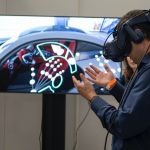The real estate industry tends to move with the times, adopting technology that helps it be successful. Both agents and clients can benefit here. Technology enables agents to manage their time better so they can serve more clients better. At the same time, clients can now see photos of properties that look the same in the pictures as it does when they see it in person. Things … [Read more...] about How Virtual Reality and Cloud Apps are Influencing the Real Estate Sector
AR / VR
Explore the world of virtual and augmented reality. Discover the latest advancements in VR and AR technology and how they are being used in various industries. Learn how to get started with VR and AR and find resources for further learning.
Will AI and Virtual Reality Make Your Marketing Campaigns Irrelevant?
Rapid advancements in the fields of virtual reality and artificial intelligence could dramatically change the nature of marketing campaigns over the next decade. Just as social media has become integral to people's lives, VR and AI could soon be just as commonplace. Where consumers go, marketers must follow, but when is the right time to jump on board? Take a peek at how other … [Read more...] about Will AI and Virtual Reality Make Your Marketing Campaigns Irrelevant?
Virtual Reality and Future Of Gaming
Virtual reality (VR) is the new big thing in gaming, offering a totally immersive experience, along with high definition that gamers are not accustomed to. The saturation and functionality of VR have increased by leaps and bounds in the recent years. The introduction of virtual reality headsets like the Oculus Rift, HTC Vive, and the PlayStation VR has created a huge interest … [Read more...] about Virtual Reality and Future Of Gaming
7 Industries Where Augmented Reality Is Making a Mark
Who knew that Augmented Reality turned 50 in 2018? When Ivan Sutherland created a head-mounted display back in 1968 that used cutting-edge computer graphics of the time to show users simple wireframe drawings, few could've predicted that it would be the first building block to what would become an industry worth over $1 billion. But today technology has advanced to the point … [Read more...] about 7 Industries Where Augmented Reality Is Making a Mark
5 Predictions on the Future of AR
There's no question that Augmented Reality (AR) technology “ in the form of glasses, headsets, and connected software “ has made rapid advances in recent years. In fact, AR is predicted by some to be the next trillion dollar industry due to the way it could potentially change the way we live, work, and play. And if the past few years is any indication, the way AR headsets and … [Read more...] about 5 Predictions on the Future of AR
What is virtual reality (VR)?
VR is a computer-generated simulation of a three-dimensional environment that can be interacted with in a seemingly real or physical way. VR is typically experienced using a headset and hand controllers, which track the user’s movements and allow them to interact with the virtual environment.
VR can be used for a variety of purposes, such as gaming, training, and entertainment. It has the potential to create immersive and interactive experiences that are not possible in the real world.
What is augmented reality (AR)?
AR is a technology that superimposes digital information or graphics onto the real world, creating a layered experience. AR can be experienced through devices such as smartphones, tablets, or specialized glasses, which use cameras and sensors to track the user’s movements and display the digital content on top of the real world.
AR is used for a variety of applications, including gaming, education, and advertising. It has the potential to enhance the real world with interactive and informative digital content.
What are the differences between VR and AR?
VR creates a fully immersive, computer-generated environment, while AR enhances the real world with digital information. VR requires specialized equipment, such as a headset and hand controllers, to experience, while AR can be accessed through everyday devices such as smartphones.
VR is typically used for fully immersive experiences, while AR is more commonly used for overlaying digital content onto the real world.
What are some examples of VR and AR?
Examples of VR include video games, educational simulations, and virtual tours. Examples of AR include Pokemon Go, Snapchat filters, and interactive museum exhibits. These are just a few examples of the many possible applications of VR and AR, which are being used in a wide range of industries and contexts.
How can I learn more about VR and AR?
There are many resources available for learning about VR and AR on Datafloq, including online courses, books, and industry events. Online courses, such as those offered by Coursera, edX, and Udacity, can provide a comprehensive overview of the technologies and their applications.
There are also many books on VR and AR that cover various aspects of the technologies and their uses. Attending industry events, such as conferences or meetups, can also be a great way to learn about VR and AR and network with others in the field. It is also possible to try out VR and AR experiences at specialized centers or through demos provided by companies that develop VR and AR technology. This can be a great way to get a firsthand experience of what these technologies are capable of.






